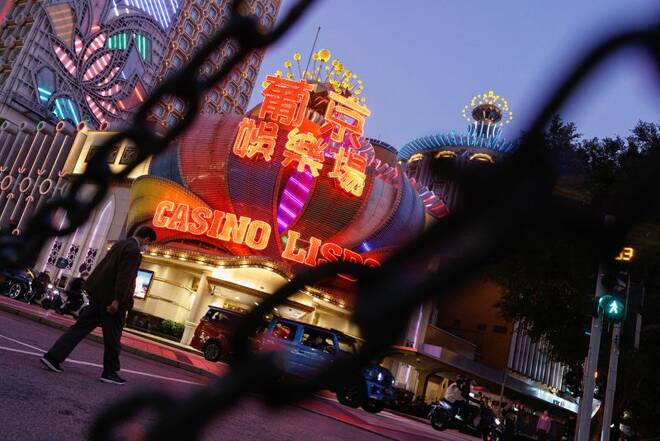Advertisement
Advertisement
Macau casinos deal themselves a tough hand with big non-gaming investment pledges
By:
By Farah Master HONG KONG (Reuters) - As casinos in Macau begin new licenses to operate in the world’s biggest gambling hub on Jan. 1, the stakes are high on whether they will be able to successfully deliver on a government mandate to diversify away from their cash-cow: gambling.
(This Jan. 2 story has been refiled to correct Melco’s name and stock symbol in the second paragraph)
By Farah Master
HONG KONG (Reuters) – As casinos in Macau begin new licenses to operate in the world’s biggest gambling hub on Jan. 1, the stakes are high on whether they will be able to successfully deliver on a government mandate to diversify away from their cash-cow: gambling.
For the last 20 years, Sands China, Wynn Macau, MGM China, Galaxy Entertainment, Melco Resorts
But their 10-year, shortened contracts come at a time when COVID-19 restrictions have decimated Macau’s gambling revenues, with 2022 the worst annual performance on record. Industry net debt is surging and operators face a new era of government oversight and control over their operations.
The recent easing of coronavirus restrictions in mainland China and Macau in December has also resulted in a wave of infections across the city, including many staff.
Upping the ante
Casinos have committed to investing a total of $15 billion in the coming decade, 90% of which must be spent on non-gaming.
But operators will find it hard to monetise their non-gaming ventures given their poor track record since 2001, when the former Portuguese colony first liberalized the industry, executives and analysts said.
Non-gaming revenues, which averaged around 5% of overall gaming revenues pre-COVID, must grow to more than 30% in the next decade, said Ben Lee, founder of Macau gaming consultancy IGamiX.
“For the past 20 years, none of the operators have managed to establish any significant progress in non-gaming.”
“Contrary to the vaunted Las Vegas model, non-gaming in Asia does not carry the same profit margin as spending behaviour is quite different over here,” Lee said, while adding that Galaxy, Melco and Sands were likely to fare better at diversifying based on their track record and management team.
Macau’s visitors have traditionally been male gamblers aged 30 and older, but more young families and women have started visiting in recent years.
Macau, a densely packed territory located on China’s southern coast, is the only place in the country where gambling in casinos is legal.
In December, following the formal awarding of their contracts, casinos unveiled non-gaming plans including indoor waterparks, health and wellness centres, art exhibitions and a large garden attraction by Sands, similar to Singapore’s Gardens by the Bay.
Key challenges
Macau’s current non-gaming attractions have focused on retail and dining, with some entertainment offerings such as Melco’s nightclubs, Galaxy’s cinema, Sands’ themed Venetian and Parisian properties and its exhibition arena.
But it pales in comparison to Las Vegas, which boasts daily entertainment and draws an international crowd. More than 90% of Macau’s visitors are from greater China, prompting the government to require operators to attract foreign tourists as part of their new contracts.
New rules also stipulate that companies must routinely submit to the government the progress of their investment projects, the value of their investments and the execution period.
Increased regulatory oversight comes as Macau casinos face much higher debt levels versus 2019. Net debt increased four-fold to $23 billion in 2022 and it may only peak by end 2023 at $24 billion, Morgan Stanley said in a December note.
Compounding casinos’ challenges, Macau lacks connectivity with international markets, has dilapidated infrastructure and a shortage of skilled labour, as well as reputational damage over its COVID management, executives said.
Macau has few direct flights from potential markets outside China, while transport within the city is limited to move large groups of people around, said David Green, head of Macau gaming consultancy Newpage.
“There is no indication that I have seen that the government is, or intends to address these weaknesses. Given the serial mismanagement of public works…it leaves concessionaires with a less than optimal host attraction proposition.”
A lack of land also hinders further development, while competition to hold conferences and exhibitions is rife from cities like Hong Kong and Singapore and within China itself.
Alidad Tash, who worked as a senior executive in Macau’s casinos since 2006 and now runs consultancy 2nt8, said the biggest challenge for operators was that mainland Chinese already have access to conventions, restaurants, shows and shopping in their own cities.
“What they come to Macau primarily for is the one thing that is not legally allowed within China: gambling.”
(Reporting by Farah Master; Editing by Kim Coghill)
About the Author
Reuterscontributor
Reuters, the news and media division of Thomson Reuters, is the world’s largest international multimedia news provider reaching more than one billion people every day. Reuters provides trusted business, financial, national, and international news to professionals via Thomson Reuters desktops, the world's media organizations, and directly to consumers at Reuters.com and via Reuters TV. Learn more about Thomson Reuters products:
Latest news and analysis
Advertisement
